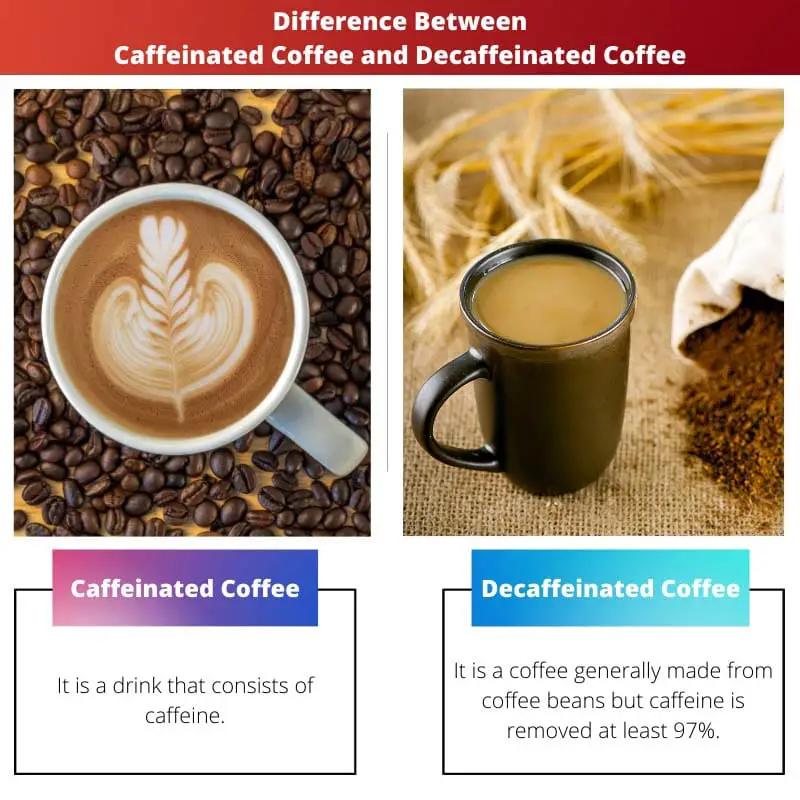Among the nine most popular beverages across the world, coffee is one of them. Coffee is liked for its flavor as well as for its caffeine content.
For a person, it might be difficult to finish a single cup of coffee with, whereas another three cups a day are not enough. So, the tolerance level also varies.
Decaffeinated coffee is the best option for a person who wants to drink coffee without the addition of caffeine.
The difference between caffeinated and decaffeinated coffee does not end with caffeine content. There are several other distinctions between caffeinated coffee and decaffeinated coffee.
Key Takeaways
- Caffeinated coffee contains caffeine, while decaffeinated coffee has removed most caffeine.
- Caffeinated coffee may cause jitters and insomnia, while decaffeinated coffee may be better for people with caffeine sensitivities.
- Caffeinated coffee has a more robust flavor profile than decaffeinated coffee, which may taste bland.
Caffeinated Coffee vs Decaffeinated Coffee
The difference between caffeinated coffee and decaffeinated coffee is that caffeine is about 70 to 140mg (per 8oz of coffee). On the other hand, the caffeine content in decaffeinated coffee is about 0 to 7mg (per 8oz of coffee). Caffeinated coffee has diuretic properties. But decaffeinated coffee does not have a diuretic effect because it does not contain caffeine.

Caffeinated coffee is a beverage that consists of caffeine. It is one of the more common natural beverages of caffeine.
Its consumption is intended partially or entirely for caffeine’s mental and physical effects. But for instance, its consumption may wake up in the morning.
Decaffeinated coffee is made from coffee beans, which boosts caffeine quality and is mostly removed before the process of grinding and roasting.
The caffeine content is in a minimal amount, approx. O to 7mg (per 8oz coffee). For caffeinated coffee, it is a good alternative.
Comparison Table
| Parameters of Comparison | Caffeinated Coffee | Decaffeinated Coffee |
|---|---|---|
| Interpretation | It is a drink that consists of caffeine. | It is a coffee made from coffee beans, but caffeine is removed at least 97%. |
| Caffeine | 70 to 140mg (per 8oz coffee) | 0 to 7mg (per 8oz coffee) |
| Taste | Strong and bitter | Flat and watery |
| Acidity | Less acidic | More acidic |
| Antioxidants | Yes | Yes, but 15% lower than caffeinated Coffee |
What is Caffeinated Coffee?
Caffeinated Coffee consists of a huge amount of caffeine, approx. 70 to 140mg (per 8oz coffee). It works to stimulate the central nervous system as well as the brain.
As a result, the onset of tiredness can be prevented and helps to stay alert.
After the consumption of caffeinated coffee, caffeine is absorbed into the bloodstream from the gut. Then it travels to the liver and affects various organs’ functions by breaking down compounds.
It affects the brain. The brain is stimulated by blocking the effects of adenosine on neurotransmitters.
Drinking caffeinated coffee may improve brain function and mood. It also boosts fat-burning and metabolism. The exercise performance may enhance.
t protects against diabetes and heart disease. It also decreases cancer risk MS risk and prevents gout.
There is a negative side to caffeinated coffee too. Its excessive intake can lead to tremors, trouble sleeping, anxiety, irregular heartbeat, and restlessness.
It might promote migraines, high blood pressure, and headaches in some individuals. It can also interact with other medications.

What is Decaffeinated Coffee?
Decaffeinated coffee is produced from coffee beans, with at least 97% of the caffeine removed from the beans. There are several ways through which caffeine can be removed from coffee beans.
Generally, they include water, carbon dioxide, or organic solvents. Before the process of roasting and grounding the coffee, the beans are decaffeinated.
The nutritional value of decaffeinated coffee compared to caffeinated coffee is identical to caffeinated coffee. However, the smell and taste might become a little milder.
Depending on the method used, its color may also change. Decaffeinated coffee is quite pleasing to people who are sensitive to the smell of caffeinated coffee and its bitter taste.
There are numerous health benefits linked to decaffeinated coffee. It reduces the risk related to liver function, premature death, and type 2 diabetes.
It may prevent aging and neurodegenerative disease. It reduces the risk of rectal cancer and symptoms of heartburn.
Decaffeinated coffee is preferred by those who want to limit their caffeinated coffee intake or are sensitive to it. Caffeine-restricted diets may also require in certain medical conditions.
So, they can also switch to decaffeinated coffee. In addition, pregnant women can also switch to decaffeinated coffee.

Main Differences Between Caffeinated Coffee and Decaffeinated Coffee
- The health benefits provided by caffeinated coffee are improved mood, mental function, and increased metabolism. Decaffeinated coffee provides the health benefits of reduced risk of liver function, aging, and type 2 diabetes.
- When it comes to side effects, caffeinated coffee can lead to anxiety, palpitations, and restlessness. But increased bad cholesterol and higher acidity levels are side effects of decaffeinated coffee.
- Coffee beans of caffeinated coffee do not go through further chemical processes. On the flip side, decaffeinated coffee has to go through a meticulous process to remove caffeine.
- Caffeinated coffee has diuretic properties, which make a person pee a lot. As a result, dehydration can occur if water intake is not enough. But decaffeinated coffee does not have a diuretic effect because it does not contain caffeine.
- There is a big no for caffeinated coffee intake by a pregnant woman because it might reduce fertility. On the other hand, decaffeinated coffee intake is not harmful during pregnancy because it might not hinder fetal development.

- https://www.sciencedirect.com/science/article/pii/S0031938499000256
- https://www.nature.com/articles/423823a

The process through which caffeine can be removed from coffee beans is fascinating. It is good to know what each type of coffee can provide health benefits.
It is fascinating to read about the health benefits and side effects of caffeinated and decaffeinated coffee, there are many aspects to consider when choosing which type of coffee to drink.
The table with the parameters of comparison is very helpful in understanding the differences between caffeinated coffee and decaffeinated coffee. It is interesting to learn about which type of coffee is better for different health conditions.
The main differences between caffeinated coffee and decaffeinated coffee are very informative. It is helpful to understand the side effects and health benefits of both.
Drinking coffee without the addition of caffeine seems to be the best way to avoid some of the negative side effects of coffee. It is interesting to read the difference between coffee with caffeine and decaffeinated coffee.
It is interesting to see the difference between caffeinated and decaffeinated coffee. I did not know that decaffeinated coffee has fewer antioxidants than caffeinated coffee.
The explanation of the health benefits of both types of coffee is very informative. It is interesting to understand how each type of coffee impacts health in different ways.
Decaffeinated coffee has some nutritional value compared to caffeinated coffee. It is interesting to see the side effects of both types of coffee.